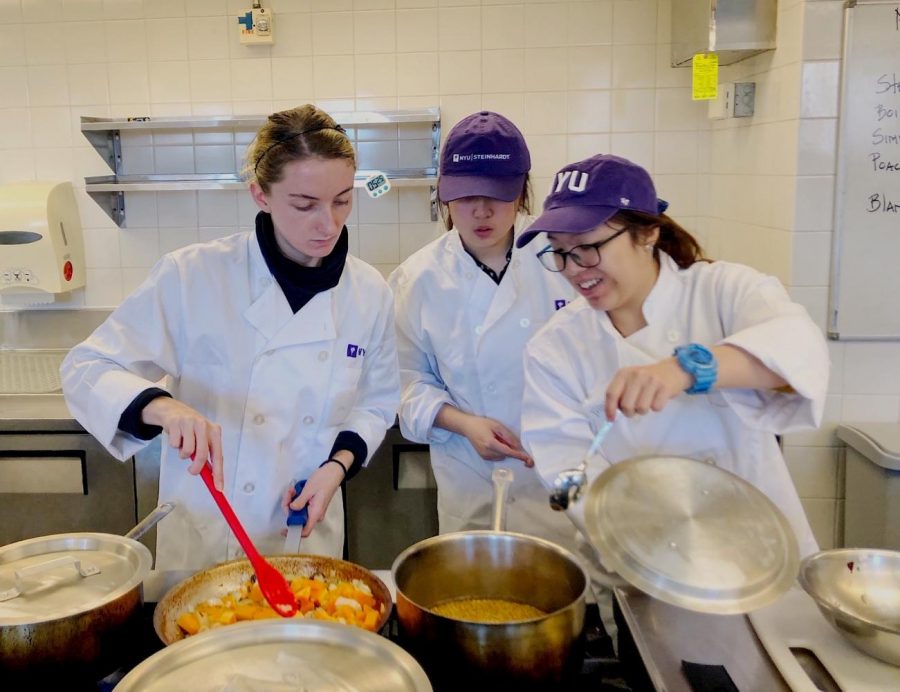The NYU Food Lab smells of freshly diced beets and toasted almonds.Students in white coats and purple baseball caps rush, purposefully, around a large kitchen.
The tantalizing sight of food on their Instagram page was one aspect of the hands-on course that appealed to me, but I wanted to know more. After emailing the NYU Food Lab professor, Lourdes Castro Mortillaro, she invited me into the lab to experience a typical session and experience what nutrition students expect to get from the lab.
The NYU Food Lab, run through Steinhardt’s Nutrition and Food Studies program, teaches students how to make sustainable food choices through hands-on learning experiences. Though the Food Lab isn’t a lab in the traditional sense, instead of beakers and graduated cylinders, you are surrounded by various sizes of pots and pans.
When I first entered the lab, I was taken aback by the size of the kitchen. In every direction, students were chopping butternut squash or sauteing vegetables. The smell of garlic lingered in the air. I felt immersed inside the unique laboratory and stayed by each station as long as I could.
Although my culinary skills are at a beginner level, I was excited to uncover how students spent their day inside the lab. My culinary experience is, to put it lightly, almost non-existent. Before the lab, I didn’t even know how to pronounce quinoa. Though my knife skills leave much to be desired, I was excited to learn more.
The instructor started the class by detailing the instructions for each recipe. Since this week’s lesson was focused on grains, we were to cook risotto and wheat berry salad. The necessary ingredients lay atop the metal countertop, which were set up beforehand by the TA, in what is known as a mise en place. Once the instructor finished, the students were divided into groups and collectively assigned each other tasks to successfully make each dish. Then, it was time to begin cooking!
Students from all years and all levels of the culinary hierarchy came to attend the introductory course. Some came unaware of the intensity of the course, whereas others were more prepared. The diversity in skill levels is what initially drew the TA, Steinhardt first-year Pooja Yerram, to the class.
‘’I enjoy working with people that are of all skill levels,’’ Yerram said. ‘’There are some people that don’t even know how to fry an egg, and then there are people that work in restaurants. So, it is really fun working with different people.’’
The courses offered at the NYU Food Lab are not just an excuse to eat delicious food or pretend that you’re Gordon Ramsay. Though the Food Lab is open to all students of all skills, the lessons and recipes become more challenging with each passing week. In a way, you are participating in NYU’s own version of MasterChef, though nobody will make you into an “idiot sandwich.”
CAS junior Paula Mora Rojas is excited by the challenge. Coming from NYU’s Abu Dhabi campus, she had been able to experiment with new ingredients and methods that were previously unavailable.
‘’It is always very hectic,’’ Rojas said. ‘’You know what you are going to come into, and after the explanation, you go straight to doing stuff. It is continuously doing stuff until you are finished. And, it is always a big chaos at the end since you get to try all the food and it is always really nice.”
My time in the Food Lab was more than just an opportunity to admire the culinary skills of other students. Watching the detail-oriented students follow each intricate step in a recipe gives you an insight into the community within the Nutrition and Food Studies department. The experience makes you want to jump right in, and stir up your own batch of risotto.
From what I can tell, my cooking skills didn’t improve from my brief experience in the lab. But I’m motivated to learn.
Email Madison San Miguel at [email protected].















































































































































